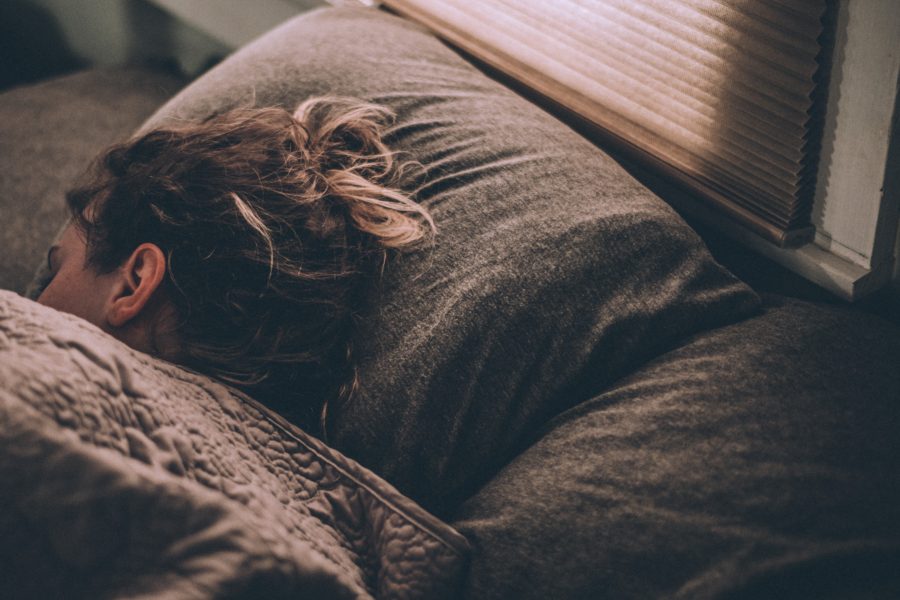
When I first started working after college, I remember chatting with my new coworkers over lunch—and so many of them would talk about not getting a good night’s sleep. At the time, as a rather naive young adult, I remember thinking: “Wow, I can’t imagine not sleeping well. I always sleep through the night!”
A few years later, I got my first taste of the battle with insomnia. Since then, I’ve had so many sleepless nights. Either I can’t fall asleep, or I wake up and can’t fall back asleep, or I wake up too early. It’s been an ongoing battle—and one that I ultimately found out was related to some thyroid issues, fluctuating hormones, and the biggest culprit: stress. Even after getting to the root of the problem, there wasn’t a magic fix. But with time and consistency, I’ve found a few things that have really helped me get a better night’s sleep.
Here are some products and practices I’ve used that I can honestly say have improved my sleep (and ultimately, my health!):
RELATED: 5 Energy Boosting Hacks to Use After a Sleepless Night
Sleep body lotion
I saw this Sleepy body lotion from Lush all over Instagram and figured it wouldn’t hurt to try! It’s now become a part of my nightly ritual. The smell is like a signal to my brain that it’s time to unwind and go to sleep—and it truly does make me feel relaxed (while also hydrating my skin). I think the lavender is the magic ingredient, as it’s a natural scent that’s known to promote relaxation and calmness. And this product is made with mostly all-natural ingredients, plus a few safe synthetics. I highly recommend it!
Eye mask
This one has been a game changer for me. I realized a big part of my sleep issues was the light that was waking me up—from my clock and the sunrise. I’ve realized that when I fall asleep with it on, it usually ends up lost in my bed somewhere. So I keep it on my nightstand, and if I wake up, I’ll pop it on and fall back asleep. Works like a charm.
Blackout curtains
If you’re having issues with sleep, these are a must. Our circadian rhythms are wired to wake our bodies up with the sun. But in our modern world, we might need that extra hour of sleep from 5 a.m. to 6 a.m. There are so many blackout curtains available, but I have odd size windows in my bedroom, so I ended up ordering the blackout fabric and DIY-ing my own window covers. It’s a cheaper alternative and keeps my room dark until I’m ready to wake up.
Self-care practices
One of the biggest things that’s truly helped me develop a more regular sleep schedule is creating a few self-care routines in the evening. I don’t do the same thing every day because for me, that feels like a chore and something I have to check off my to-do list. I switch things up, and that means sometimes I’ll take a bath before bed, read for 30 minutes, watch a funny show, or journal. And the one thing I try to always do is leave my phone in the kitchen, away from my bed. All of these practices have really, really helped me to unplug and unwind—and get better sleep!
RELATED: How Waking up Early Changed My Life
White noise machine
I’m super sensitive to noise as I fall (and hopefully, stay) asleep. Living in an apartment with some noisy neighbors, I’ve had to find solutions to cover up their noise so I can get my z’s. This is when I discovered the white noise machine. I turn it on before I fall asleep (usually listening to ocean waves, sometimes to rain), and it helps dull out any other sounds that might wake me up.
Magnesium supplements
I’m not a doctor, so be sure to check with yours before taking any supplements. But I do know that lots of people are low in magnesium (including me). It’s known for helping your body calm down, and therefore, a deficiency can contribute to your struggle for a good night’s rest. Taking a magnesium supplement has helped me. Sometimes I’ll take it with a cup of Sleepytime tea too.